| Srl | Item |
| 1 |
ID:
079836
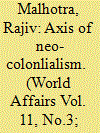

|
|
|
| 2 |
ID:
179407
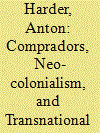

|
|
|
|
|
| Summary/Abstract |
This study of China's relations with Algeria and India shows that the Mao-era emphasis on the transnational function of class made it fundamentally sceptical of the privileged status of the nation-state and transformed Beijing's posture towards the Third World in the late 1950s and early 1960s. Beijing's sense of a growing matrix of transnational class forces damaged relations with India, a key Third World moderate, and spurred closer ties with non-state, revolutionary movements like the Algerian Front Libération Nationale (FLN). Thus Beijing retreated from the post-Korean War phase of moderate diplomacy during which it had eschewed support for revolution abroad under the rhetoric of the ‘Five Principles of Peaceful Coexistence’. This article relates Beijing's class analysis of the growing challenges in its relations with India to the arc of interactions between the communist Chinese, the FLN revolutionaries, and the newly post-colonial Algeria. It demonstrates that because of Beijing's understanding of how the domestic class category ‘comprador’ facilitated ‘neo-colonialism’ (an emerging Third World concept), China's anti-imperialism must be understood through its perception of the transnational function of class forces. This understanding of the post-colonial dilemma—how far to maintain or sever ties with the West, which grew partly from Chinese perceptions of Indian politics—explains the curious difficulty that Beijing faced in maintaining cooperative relations with many newly independent nations like Algeria. The emphasis on transnational class struggle also provides an interpretation of Beijing's foreign policy which is intimately linked to domestic politics and affirms the contribution of ideology to the Sino-Soviet split.
|
|
|
|
|
|
|
|
|
|
|
|
|
|
|
|
| 3 |
ID:
096618
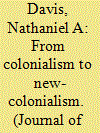

|
|
|
| 4 |
ID:
131918
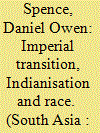

|
|
|
|
|
| Publication |
2014.
|
| Summary/Abstract |
This article examines the colonial legacies in the development of the Indian and Pakistani navies following Independence. As both navies struggled with problems of indigenising their forces, Britain endeavoured to maintain its regional hegemony by extending the professional dependency of both. The influence of imperial ideologies and racial discourses of power on these relationships and on Indian naval identity caused India's and Pakistan's navies to evolve in different directions, as did Cold War geopolitics and civil-military relations. By analysing the challenges faced by India in achieving strategic independence, this article widens existing debates surrounding the neo-colonialism of Indian governance and education during the Nehruvian period, the reinvigoration of Empire and the limits of British imperial power after World War II.
|
|
|
|
|
|
|
|
|
|
|
|
|
|
|
|
| 5 |
ID:
025330
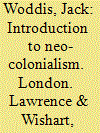

|
|
|
|
|
| Publication |
London, Lawrence & Wishart, 1967.
|
| Description |
ix,133p.
|
|
|
|
|
|
|
|
|
|
|
|
Copies: C:1/I:0,R:0,Q:0
Circulation
| Accession# | Call# | Current Location | Status | Policy | Location |
| 001117 | 325.3/WOD 001117 | Main | On Shelf | General | |
|
|
|
|
| 6 |
ID:
188317
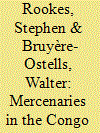

|
|
|
|
|
| Summary/Abstract |
Often maligned by academics and international organisations alike, mercenaries are perceived as being a contributory factor to the worsening of conflict and as a threat to democracy. This chapter demonstrates that this reputation is not wholly deserved, and that in certain cases mercenaries have made a valuable contribution to creating stability in highly unstable contexts. Also, this chapter questions certain interpretations relating to the role and identity of mercenaries. Far from being cold-blooded avaricious killers, we show that there is a range of different reasons why someone becomes a mercenary and argue that the aforementioned categorisation has been used as a political tool.
|
|
|
|
|
|
|
|
|
|
|
|
|
|
|
|